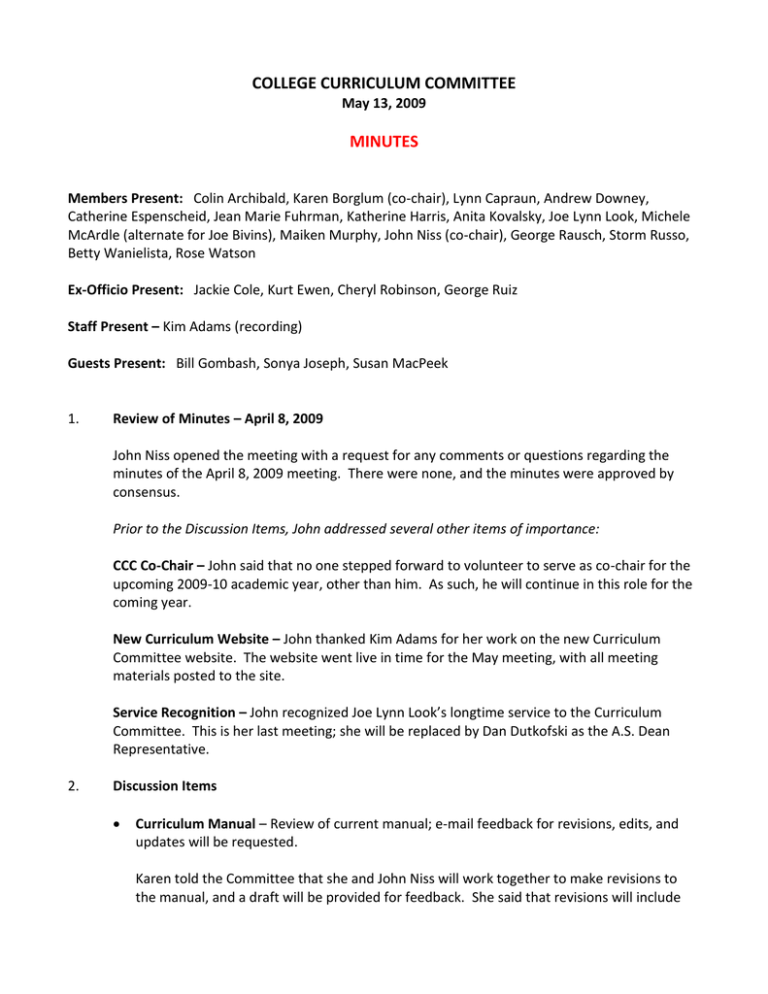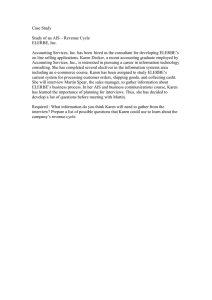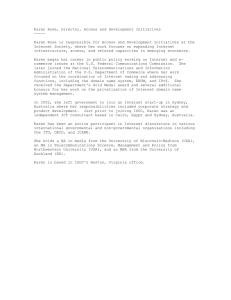COLLEGE CURRICULUM COMMITTEE MINUTES
advertisement

COLLEGE CURRICULUM COMMITTEE May 13, 2009 MINUTES Members Present: Colin Archibald, Karen Borglum (co-chair), Lynn Capraun, Andrew Downey, Catherine Espenscheid, Jean Marie Fuhrman, Katherine Harris, Anita Kovalsky, Joe Lynn Look, Michele McArdle (alternate for Joe Bivins), Maiken Murphy, John Niss (co-chair), George Rausch, Storm Russo, Betty Wanielista, Rose Watson Ex-Officio Present: Jackie Cole, Kurt Ewen, Cheryl Robinson, George Ruiz Staff Present – Kim Adams (recording) Guests Present: Bill Gombash, Sonya Joseph, Susan MacPeek 1. Review of Minutes – April 8, 2009 John Niss opened the meeting with a request for any comments or questions regarding the minutes of the April 8, 2009 meeting. There were none, and the minutes were approved by consensus. Prior to the Discussion Items, John addressed several other items of importance: CCC Co-Chair – John said that no one stepped forward to volunteer to serve as co-chair for the upcoming 2009-10 academic year, other than him. As such, he will continue in this role for the coming year. New Curriculum Website – John thanked Kim Adams for her work on the new Curriculum Committee website. The website went live in time for the May meeting, with all meeting materials posted to the site. Service Recognition – John recognized Joe Lynn Look’s longtime service to the Curriculum Committee. This is her last meeting; she will be replaced by Dan Dutkofski as the A.S. Dean Representative. 2. Discussion Items Curriculum Manual – Review of current manual; e-mail feedback for revisions, edits, and updates will be requested. Karen told the Committee that she and John Niss will work together to make revisions to the manual, and a draft will be provided for feedback. She said that revisions will include adding the general education piece to the outcomes; the revised voting process, approved by Faculty Council; A.A. Pre-Major section will have major revisions, including the addition of Transfer Plans. The CLAST process will be removed, as this test is being replaced with minimum scores from either the SAT or the ACT tests, or a minimum 2.5 cumulative GPA. If these standards are not met, the State will most likely provide guidelines on the course of action. Curriculum Agenda Deadlines – Discussion of adherence to established deadlines, with an emphasis on the deadline for the annual Catalog meeting. Karen addressed this issue, beginning with a request from the division of Admissions and Records/Graduation, who would like to see the deadline for submission of proposals for the Catalog moved up to February. Karen said that, traditionally, February had been the deadline for all additions and changes for the upcoming year’s Catalog, but as of late, the deadline has not been adhered to. Karen told the Committee that Banner/CAPP programming is a very time consuming process, and they have expressed the desire to have more lead time to be able to get the work completed in time. Over the past several years, registration has been moved up; combined with early and Honors registration, this makes it difficult to impossible to have everything programmed in time. A vote was taken, with all in favor of establishing a “clean” deadline of February. A broadcast e-mail will be sent informing everyone who needs to know of this change. Foundations of Excellence (FoE) – Kurt Ewen will present the report from the FoE, addressing those items of concern to the College Curriculum Committee. Kurt Ewen and Sonya Joseph were present, representing the Foundations of Excellence (FoE) team. Kurt showed the Committee a PowerPoint presentation, which was used in their presentation to the College Learning Council (CLC) on May 7, 2009. Kurt began by asking how many Curriculum Committee members and others present had been “touched,” or aware of the FoE process. The process began with the identification of performance indicators for the nine foundational dimensions and the establishment of a team to work on each specific dimension. The dimensions are: Philosophy Organization Learning Campus Culture Transitions All Students Diversity Roles and Purposes Improvement Page 2 More than 180 Valencia employees consisting of faculty, staff, and administrators were included in the process, working on one of the nine teams. A student survey was taken, with 1,245 students participating; additionally, there was a survey conducted for faculty and staff, with 1,008 participating. Dimensions team work began after consultant John Gardner’s September 2008 visit. Reports were ready for October for Learning Day. During Learning Day, a “marathon” meeting took place, during which a New Student Philosophy statement was developed, as well as the development of a New Student [expanded] Definition. More than 90 recommendations were made, with the emergence of six global themes: New Students Transitioning Into Valencia Coordinated New Student Experience Learning Data Collection and Dissemination Faculty and Professional Development Communication Valencia had a Philosophy Statement in place, but that statement was not specific to new students. A new statement was developed, as well as a New Student Definition. The new student is now defined as any student who has completed fewer than 15 college-level credits at Valencia. This means that this definition will not necessarily include only first year students, but is expanded to include some dual enrollment and transfer students. Sets are being studied so that monitoring can take place. One of the challenges discussed that played a part in the development of the global themes were Valencia’s current Web Site. It was felt that improvements need in order for the site to be more student-friendly. The Coordinated New Student Experience theme came from a feeling that, although a lot of things are being done for students, but those things are not necessarily coordinated between departments or integrated in a way that is useful. Included in the presentation were possible implications for the Curriculum Committee. FoE is working on finding a consistent approach to the courses that are the top 10 enrolled courses for new students. Those are: ENC 1101 POS 2041 SLS 1122 SPC 1600 MAT 0024C PSY 1012 MAC 1105 MAT 0012C HUM 1020 MAT 1033C The team would like to see learning in college prep courses infused with the front door courses; there should be a strong connection. In addition, faculty members who teach college prep courses often feel like they are not really a part of the college, but in a silo. Page 3 A report was presented to the CLC on May 7, with a request to proceed with a list of “Action Items” developed by the team. The action items are as follows: Dissemination of New Student Philosophy Statement and Definition New Student Experience Committee Learning Assessment Realigning AtD Data Team Begin looking for resources (this will include the already-applied-for Gates Grant; other grants will be searched for) Class/Lab/Contact Hours – Discussion regarding how these hours are established at Valencia, how other colleges establish these hours, and Florida Department of Education guidelines. Also, how are contact hours established vs. instructional minutes? Karen told the Committee that she and Kim did some research to see how other colleges in Florida establish their lab and instructional hours and to find out if the State has any policy governing this. Karen said that she found that there is a lack of consistency among the colleges. The State Course Numbering System (SCNS) e-mailed her guidelines that she had seen in the past, but for the most part, colleges do have a level of freedom in establishing those hours. Although there were details regarding how classroom/lecture hours translate into credit hours, the lab piece was unclear. Karen communicated with several academic deans, who provided feedback as to how their divisions establish contact hours. She asked the CCC for guidance on how to proceed, if at all. Does there need to be written guidelines established regarding how credit and contact hours are determined? She said that the issue is twofold: 1. 2. How are lab hours being determined? How does that translate into credit hours? There was consensus that there needs to be consistency. Karen asked for input on how to do this. She said that it would make sense for individual divisions to meet and work out consistency for their specific disciplines. Joe Lynn suggested forming a sub-committee that will look at other colleges to find out what they are doing, and bring data back to the CCC for recommendations. Karen asked who would be willing to volunteer to work with this group. Volunteers were Anita Kovalsky, Colin Archibald, Joe Bivins, and Betty Wanielista. Karen will chair the group. Melody Boeringer will be asked if she is interested in serving on this sub-committee. Course Substitutions – Issues surrounding the courses students may select for substitution, language used in communication with students, etc. Karen said that the current list used for college prep math substitution, in some cases, does not make sense (i.e., student cannot pass prep math, but are told they may substitute math courses that would be considered higher level). We are trying to be sure that the Page 4 quantitative reasoning portion of General Education is achieved; this can be done in ways other than with math courses. Karen said that the work the FoE will be doing this summer may assist in forming options. A task force will be formed to look at this list and make recommendations for current substitutions that need to be changed, and courses that may need to be added. Karen said that it’s important to remember that once a student is given a course substitution, it will limit their educational opportunities. The student must be made to understand that there must be a really good reason for a substitution; it should not be a reason to simply “get out” of a math course. For foreign language course substitutions, it will be more important to find courses that indoctrinate students in the culture of the language, rather than learning the language itself. John also suggested that a Principles and Procedures for Course Substitutions task force be formed. Rose Watson, John Niss (who was asked to chair), and Catherine Espenscheid volunteered. 3. Consent Agenda – Course modifications or deletions involving minor editing of course descriptions or level changes which do not impact other departments are eligible for placement on the consent agenda. Any members of the committee may request to remove a proposal from the consent agenda for the purpose of discussion. The following courses have outlines in Course Outline Builder which may be viewed in ATLAS: (Please note that the Office for Curriculum and Articulation has reviewed these outlines and compared them with the existing courses, and have found there are no material differences.) BUL CJK CJK 2242 0082 0083 Business Law II Law Enforcement Traffic Stops Law Enforcement DUI Traffic Stops 0809-155 NUR 1061C Health and Physical Assessment, CCD ...................... Karen Borglum Purpose: Course is not taught as part of the Nursing Program any longer; Effective Date: Fall 2009 (201010). The Consent Agenda was approved as submitted. 4. Regular Agenda 0809-156 CJK 0082 Law Enforcement Traffic Stops, CCA ................................ Jeff Goltz Purpose: The Florida Department of Law Enforcement Standards and Training Commission has mandated changes in the Law Enforcement Program for the State of Florida; Catalog Course Description: The student will learn legal issues and traffic law, professional traffic stops and Page 5 discriminatory profiling, unknown risks of traffic stops, and the identification, initiation, and application of tactical approaches to high risk traffic stops; Prerequisites/Co-Requisites: None; PSAV/Class/Contact Hours: 0.8/24/24; Effective Date: Fall 2009 (201010). 0809-157 CJK 0083 Law Enforcement DUI Traffic Stops, CCA .......................... Jeff Goltz Purpose: The Florida Department of Law Enforcement Standards and Training Commission has mandated changes in the Law Enforcement Program for the State of Florida; Catalog Course Description: This course provides an overview of the DUI problem, DUI detection, drugimpaired driving, the Standardized Field Sobriety Tests, and DUI report writing. Legal issues regarding DUI traffic stops are also discussed; Prerequisites/Co-requisites: None; PSAV/Class/Contact Hours: 0.8/24/24; Effective Date: Fall 2009 (201010). Proposals 0809-156 and 0809-157 were approved as submitted. 0809-158 MUS 2360 MIDI Production, CCM ................................................ Raul Valery Purpose: Revise course title to match courses in the State system that have similar content, which will assist with transferability; Revised Course Title: MIDI and Electronic Music I; Effective Date: Fall 2010 (201110). This proposal was approved as submitted. 0809-159 MUS 2361 MIDI and Electronic Music II, CCA ................................. Raul Valery Purpose: The Industry Advisory Committee recommends this addition to provide additional skills which would make our graduates more employable and would open new opportunities for employment. In addition, this course makes possible articulation agreements easier as these are skills expected at the junior level in a four-year college; Catalog Course Description: This course is designed to provide students further practical study in MIDI with particular focus on sound synthesis, sampling, remixing, and software synthesizers, as well as special emphasis on advanced techniques in MIDI sequencing, editing, multi-track recording, composition and arranging, plus a broad view of electronic music and its history. (Special Fee: $85); Prerequisites: Minimum grade of C in MUS 2360; Co-requisites: None; Credit/Class/Lab Hours: 3/1/4; Effective Date: Fall 2009 (201010). Some members of the CCC had questions regarding this proposal, and Raul Valery was not present. It was decided that Raul would be asked to send an e-mail to Karen Borglum answering their questions, particularly with regard to an articulation agreement that could affect the number and viability of the course. This was done, and Raul’s response was forwarded to the Committee. Eleven votes (a majority) were received; all votes were “Yes.” Based on electronic voting, the proposal was approved as submitted. 5. Information Items Radiography Courses Lab Designation – An “L” will be placed after the course number for each of the Radiography Program courses below, for consistency with other college lab courses: RTE 1804; RTE 1814; RTE 1824; RTE 2834; and RTE 2844 Page 6 Education Common Prerequisite Changes – As the result of a workgroup of college and university educators, established by the DOE in 2007 to examine the three required prerequisites common to all baccalaureate education programs in Florida’s public postsecondary system, these courses have undergone title and course description changes. At the conclusion of the meeting, Michele McArdle introduced Susan MacPeek, who is the new weekend/evening Manager of Credit Programs at the Winter Park Campus. As a final Information Item, Karen passed out a list of those CCC members who are interested in continuing on the Committee, as well as positions still needed. She asked CCC members to go back to their respective departments and solicit members for the Committee. Bill Gombash, in attendance, stated his desire to be the At-Large Alternate; Katherine Harris said that Regina Seguin would like to be the Library Alternate. All volunteer names will be taken to the next Faculty Council meeting for appointments to be confirmed. The next meeting of the College Curriculum Committee is scheduled for June 10, 2009, and will be held on the East Campus, Room 3-113. Deadline for submission of material for the June agenda is May 27, 2009. Page 7



